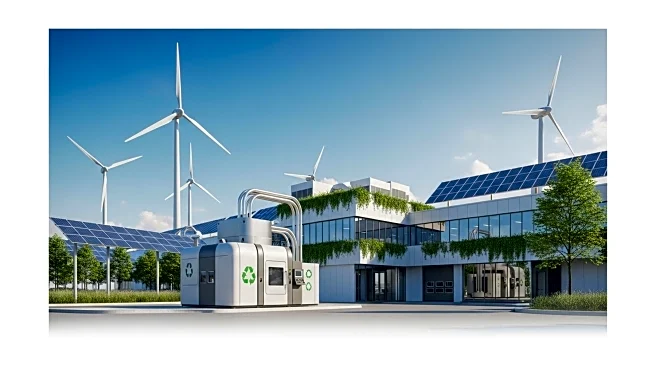What's Happening?
Ras Al Khaimah Economic Zone (RAKEZ) is leading efforts in sustainable manufacturing in the UAE by implementing eco-friendly regulations, smart infrastructure, and business incentives. RAKEZ aligns with the UAE's Net Zero 2050 agenda and Ras Al Khaimah's Energy Efficiency and Renewables Strategy 2040, promoting practices like greywater systems and solar water heating. The zone hosts companies like Ni Met Recycling, VIM Solar Robotics, and Circular Computing, which contribute to the circular economy by recycling materials and producing eco-friendly products. RAKEZ's infrastructure includes district cooling systems and retrofitting initiatives that enhance resource efficiency.
Why It's Important?
RAKEZ's initiatives in sustainable manufacturing are crucial for advancing the UAE's environmental goals and supporting global climate objectives. By fostering a green industrial ecosystem, RAKEZ not only contributes to reducing waste and promoting renewable energy but also enhances the competitiveness of its tenants. The success stories of companies within RAKEZ demonstrate the potential for sustainable practices to drive economic growth and innovation. As the UAE continues to prioritize sustainability, RAKEZ's model offers a blueprint for other regions seeking to balance industrial development with environmental responsibility.
What's Next?
RAKEZ plans to expand its efforts in sustainable manufacturing by increasing onsite renewable energy and fostering collaboration among companies to utilize by-products as resources. The zone aims to share transparent ESG data and reinforce its role as a pioneer in sustainable industrial growth. As RAKEZ continues to develop its green framework, it will likely attract more businesses committed to environmental sustainability, further solidifying its position as a leader in the UAE's green economy.
Beyond the Headlines
RAKEZ's commitment to sustainability extends beyond infrastructure to community engagement, involving local residents in environmental initiatives like beach clean-ups and recycling drives. This approach fosters a culture of responsibility and strengthens the impact of RAKEZ's industrial policies. The zone's focus on efficiency and circularity demonstrates how industrial growth in arid regions can be both economically competitive and environmentally responsible, setting a precedent for sustainable development in similar contexts.









